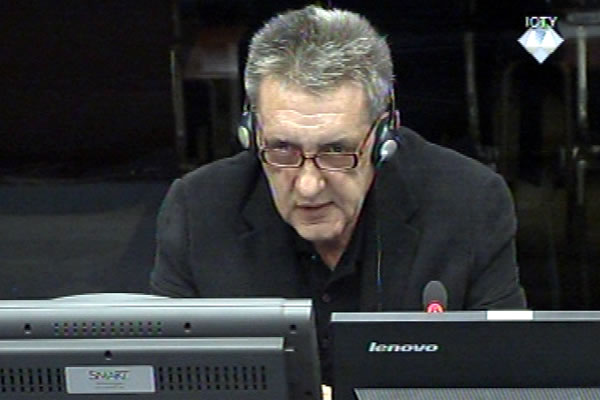Home
KARADZIC’S SWEET WITNESS
Former member of the SOS unit from Sanski Most Dusan Mudrinic Medeni claims that the Muslims from that municipality first demanded to be ‘sheltered’ in prison facilities and then left the town ‘of their own free will’. Before they left, the Muslims ‘gifted’ their business premises and cars to their Serb ‘friends’, including the witness himself
 Dusan Mudrinic, witness at the Radovan Karadzic trial
Dusan Mudrinic, witness at the Radovan Karadzic trial The indictment against Radovan Karadzic alleges that the crimes committed in Sanski Most reached the scale of genocide. Defense witness Dusan Mudrinic Medeni contends that the Serb authorities’ policy towards the local Muslims and Croats was ‘fair’. Mudrinic was a member of the SDS and the SOS (Serbian Defense Forces) unit. The SOS was under the command of Dusan Saovic Njunja, until his death in late 1992. The unit operated as part of the VRS 6th Sana Brigade.
In his statement to the defense team the witness said that the loyal non-Serbs in Sanski Most were not placed under arrest. In fact, he claimed, they wanted to gather in the sports hall, and afterwards many of them left the town ‘of their own free will’. Mudrinic explained that the local authorities then proceeded to put Serb refugees in the houses abandoned by the non-Serbs. The witness admitted that there were some isolated incidents when crimes were committed against local Muslims and Croats by irresponsible individuals; the authorities did not condone such actions.
In the cross-examination, prosecutor McKenna called evidence showing that the crimes against the non-Serbs in Sanski Most were committed systematically and on a large scale. The witness’s unit, the SOS, carried out most of the attacks. According to the prosecution’s evidence, before the war even started, the group was involved in blowing up Muslim-owned buildings. Mudrinic denied the allegation, saying that the buildings were not blown up with explosives: people were throwing hand grenades at them. He didn’t know who threw the hand grenades. A report on the performance of the SOS unit in 1992 notes that the unit blew up non-Serb buildings because the ‘Ustashas and the Green Berets couldn’t be destroyed in any other way’. In the prosecutor’s view, this was not about ‘destroying’ the enemy forces, but forcing the Muslims to move out. ‘On the contrary, we tried to persuade them to stay but their desire to leave was stronger’, the witness replied.
The pressure grew stronger as the war broke out, the prosecutor said, when the non-Serb civilians were arrested, detained and beaten at several locations in town. The SOS unit wholeheartedly assisted in the attacks. The locations included the police building, the sports hall and the Betonirka factory plant. The witness didn’t deny that he ‘helped out’ in the arrests. The only thing he knew about the beatings was that that they took place in Betonirka, but he ‘never saw any of it, just heard about it’. Prosecution witnesses identified Danilusko Kajtez, a member of the SOS unit, as the person responsible for an incident in which six Muslims were beaten to death en route to the Manjaca prison camp. Mudrinic knew nothing about it. Kajtez, who had changed his name to Nikola Kovacevic, was sentenced to 12 years by a Sarajevo court for his crimes.
The prosecutor noted that the non-Serbs property was seized forcibly. Businesses and houses ended up in the hands of Serbs, particularly the SOS unit members. The witness himself took the café Neli, the unit commander Njunja took the café Gold and Goran Cankovic ended up with the café Spajder. Mudrinic tried to convince the judges that not everything was what it seemed. He claimed that Muslims had given their houses and cafés to their ‘Serb friends’. The change in ownership was a voluntarily thing, done in accordance with the law and in the presence of a lawyer. The same thing happened with the cars that were also ‘donated’ by the Muslims.
In September 1995, Zeljko Raznatovic Arkan and his notorious paramilitary unit came to Sanski Most from Serbia. According to the testimony of several prosecution witnesses, Mudrinic acted as Arkan’s guide as the group went about arresting Muslims. This was a real manhunt: people were rounded up on the streets and in their homes, they were beaten up, thrown into the car trunks and taken to prison camps. Many of those arrested were never seen alive again. The witness was adamant that he never beat up anyone or entered any Muslim houses.
In a bid to show the court how sweet-natured his witness was, Karadzic noted in the re-examination that Mudrinic’s nickname, Medeni, was ‘derived from the word honey’. The witness added that Medeni meant ‘sweet’. As the hearing drew to a close, Momcilo Gruban began his evidence in Karadzic’s defense. He is a former guard shift commander in the Omarska prison camp.
Linked Reports
- Case : Karadzic
- 2014-02-18 KARADZIC’S THEORY ABOUT BODIES IN TOMASICA
- 2014-02-18 KARADZIC WANTS MILDER SENTENCE BECAUSE OF HIS ‘AGREEMENT’ WITH HOLBROOKE
- 2014-02-17 SERB AUTHORITIES AND KORICANSKE STIJENE CRIME
- 2014-02-20 KARADZIC DECIDES NOT TO TESTIFY IN HIS OWN DEFENSE
- 2014-02-27 KARADZIC WANTS ONE YEAR TO PREPARE HIS FINAL BRIEF
- 2014-02-27 ‘GENTLEMEN’S AGREEMENT’ MAY HELP KARADZIC
